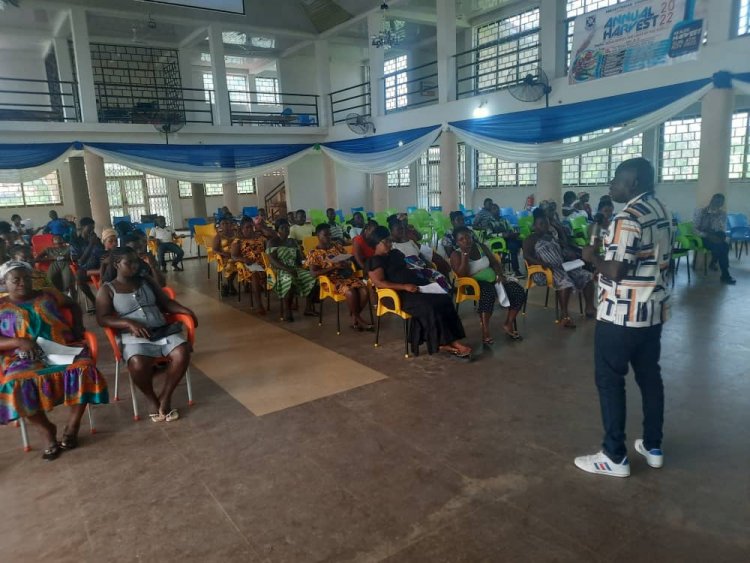Asutsifi North Women, Youth Lash Out At District Assembly Over Training Programmes By NGOs
The participants numbering about 50 mainly women and youth drawn from mining communities in Asutsifi North District registered their displeasure at the way the district assembly was going about training programmes being spearheaded by some NGOs to help them improve their lot.

Participants at a forum to support women and youth in the Asutsifi North District to identify alternative business practices and local content opportunities in mining and agriculture value chains have lashed out at the district assembly.
The participants numbering about 50 mainly women and youth drawn from mining communities in Asutsifi North District registered their displeasure at the way the district assembly was going about training programmes being spearheaded by some NGOs to help them improve their lot.
This was in reaction to a brief remark by the Assistant Development Planning Officer of Asutsifi North District, Mr. Alphorns Amoako, during the forum.
The forum was organised by Wacam, a community based human rights and environmental mining advocacy, in partnership with Oxfam in Ghana, in the Asutsifi North District on Friday, December 9, 2022.
It aimed at opening avenues for broader consultation and discussions on local content, alternative skills and business development opportunities in mining communities for the benefit of the locals.
According to them, information about such training programmes was not enough, a reason many of them said they were not even aware to enrol.
In this regard, the participants called on the Asutsifi North district assembly to use the information vans to disseminate information on handcraft training programmes by NGOs for the community members.
“Using only the information centres to give announcements on some of these training programmes was not enough. In fact, that explains why many of us in the Asutsifi North District do not get such information to enable us also enrol,” Auntie Abena, a participant, lamented.
Furthermore, the participants asked the district assembly to be transparent with the whole selection process to prevent defeating the object of the training programmes.
Earlier, the Programmes Officer of Centre for Environmental Impact Analysis (CEIA), Paa Kwesi Sackey, delivered a presentation on “Alternative Business and Skills Development Programmes for Women and Youth in Asutsifi North District.”
The goal of the study, he disclosed, was to assess the training needs of young people within the age bracket of (15-35 years) living within the concessions of Newmont Gold Ghana Limited-Ahafo Mine and Kibi Goldfields Limited to enable them participate effectively in local content initiatives of the mining companies.
He indicated further that the research also looked at what level of skills by the local indigenes were available for employment; the category of employment (i.e., unskilled, skilled labour such as technical, managerial, etc.,) within the life cycle of the mine is available to the indigenes; and whether or not the educational background of local indigenes match with the employable opportunities within the mining industries.
The programmes officer of CEIA said the study made the following findings including the fact that most of the locals in Asutsifi North were eager to work in the mining companies, especially the male youth; most of the female youth were desirous to be trained and work on alternative livelihoods such as fashion, food and confectionary industry to service the mine workers, and; that only a handful of the locals have postgraduate and graduate educational qualification to enable them secure permanent jobs in the companies in the senior staff category.
However, Mr. Sackey pointed out that the study found out that majority of the respondents had BECE or WASSCE as their highest educational qualifications and that they agreed also to the fact that in order for them to secure more permanent jobs in the companies their capacities needed to be built.
Against the above, he spelt out the recommendations of the research. These, he disclosed, include the designing of a training curriculum to train respondents on relevant skills they need to secure jobs in the mining industry.
“A technical training institute is preferable for the male population, and a commercial hand craft skill set is preferable for the female population,” the study submitted.
Such training curriculum, according to Mr. Sackey, should not only be focused on assisting them to work in the upstream section of the mining industry but also the downstream.

 Freeman Koryekpor
Freeman Koryekpor 

































